B.E.T.A. Challenge Winners Rack Up Double the Awards
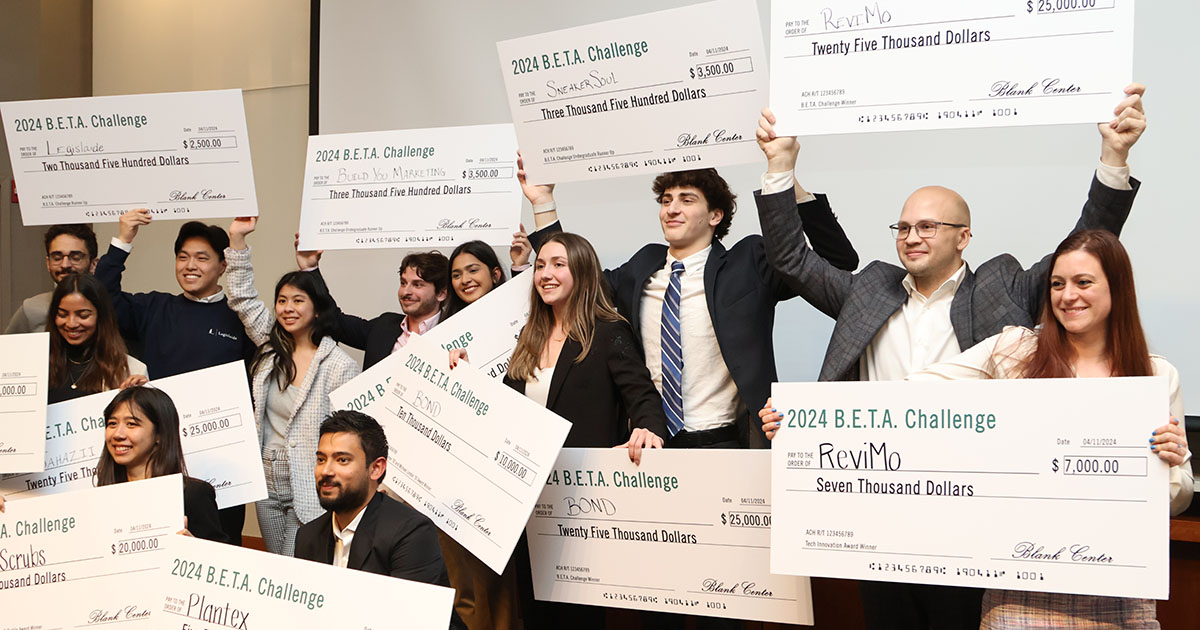
It was double the accolades for all three winning ventures at Babson College’s acclaimed B.E.T.A. (Babson Entrepreneurial Thought & Action®) Challenge of 2024—which was live-streamed at a watch party for the first time.
All the winning ventures also won special awards, leaving the teams doubly thrilled and grateful at the end of Babson’s well-known competition.
“We started at Babson, and without Babson, we would never have been able to make this happen,” Aleksandr Malashchenko MBA’24 said.
Malashchenko’s venture, ReviMo, a robotic mobility device that allows bedridden people to get out of bed by themselves, won the graduate track competition as well as a $7,000 Technology Innovation Award sponsored by Gautam Gupta ’07.
Alumni track winner Vaidehi Tembhekar MBA’21 of Jahazii, a company focused on connecting lenders to growing businesses in Africa, also took home the $10,000 High Impact Woman Founder Award, sponsored by the Frank & Eileen Center for Women’s Entrepreneurial Leadership.
And, undergraduate track winner Chloe Samaha ’25 of BOND, an AI-powered site that helps virtual employees connect and engage, also won the $10,000 Stephen H. Kramer ’92 and Michael London ’92 Award.
Alexandra Dunk MBA’22, Associate Director of Entrepreneur Programs and Engagement at the Arthur M. Blank Center for Entrepreneurship, welcomed the audience, both live and live-streaming, April 11 at Joseph L. Winn Auditorium in Olin Hall.
“The B.E.T.A. Challenge recognizes the progress and potential of Babson ventures as they seek to solve problems and create impact,” said Dunk. “This year’s finalists have worked really, really hard to get here, and they truly embody Entrepreneurial Thought & Action.”
The three winning ventures each received $25,000 in cash, as well as in-kind services donated by sponsors. The runners-up in the alumni and graduate track received $2,500, while the runners-up in the undergraduate track won $3,500 each.
B.E.T.A. Challenge Watch Party
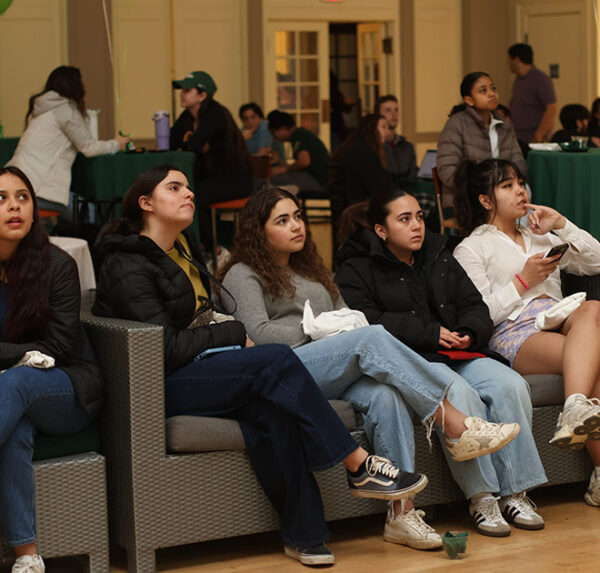
Babson’s first-year students were able to watch the pitches and award announcements live as part of the College’s core Foundations of Management and Entrepreneurship (FME) program. The signature course asks students to develop, launch, and manage a new venture.
The watch party, held at the College’s Knight Auditorium and created in collaboration with FME faculty leads Assistant Professors Angela Randolph and Michele Kerrigan, was a celebratory affair that also marked the official close of business for FME teams.
“We believe that the B.E.T.A. Challenge Finale is a meaningful moment for the Babson community to come together and see exceptional entrepreneurial talent in action,” Dunk said, adding that she’s grateful to the FME faculty for their work creating the watch party. “We were thrilled to welcome FME students into this tradition and hope that the pitches inspire them to pursue their own entrepreneurial goals.”
Jahazii
Alumni winner Tembhekar created Jahazii, in part, because of the struggles she faced when trying to get financial backing for a former business in Kenya.
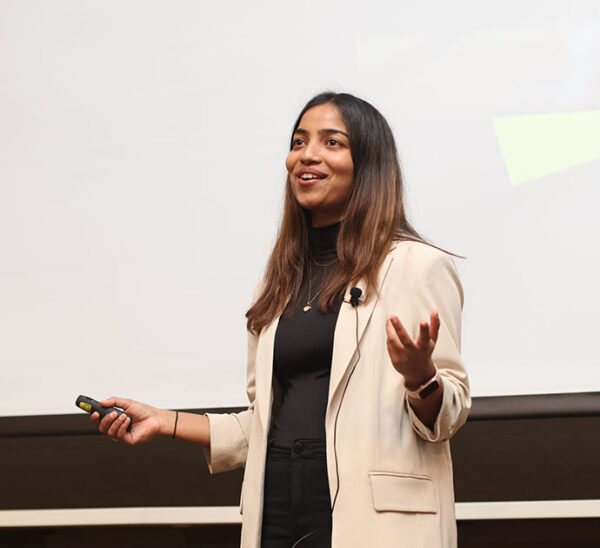
While there is plenty of capital available in Africa to support the many small and medium businesses that need financial backing to thrive, many local lenders are ill-equipped to make those loans.
“Africa is a continent full of endless opportunities, a continent where small- and medium-sized business make up 18 percent of employment and 50 percent of its GDP, and yet access to affordable financing remains a distant dream,” Tembhekar told judges.
Jahazii would work from end to end during the lending process, Tembhekar said, streamlining the process for both institutions and businesses.
The other alumni finalists were Ralph Haddad ’20, MS’21 and his venture, HospiceMatch, which aims to build an operating system for hospices, and Legislaide, a legislative AI co-pilot tool designed by Vivian Nguyen ’22 and Chris Gomez to help local governments streamline their day-to-day process.
Alumni judges were Jennifer Davis, an investment principal at Techstars Boston; Stephen Kramer ’92, CEO at Bright Horizons; and Michael London ’92, CEO and founder of Uwill.
ReviMo
Malashchenko began his pitch with a picture of his grandfather, Nikolay, a man he remembers as strong and proud.
“In my mid-20s, he became paralyzed by a stroke, and now I had to take care of him,” Malashchenko said. “It was always painful and embarrassing for him to ask someone to take him to the toilet, and he always wanted to get back his dignity.”
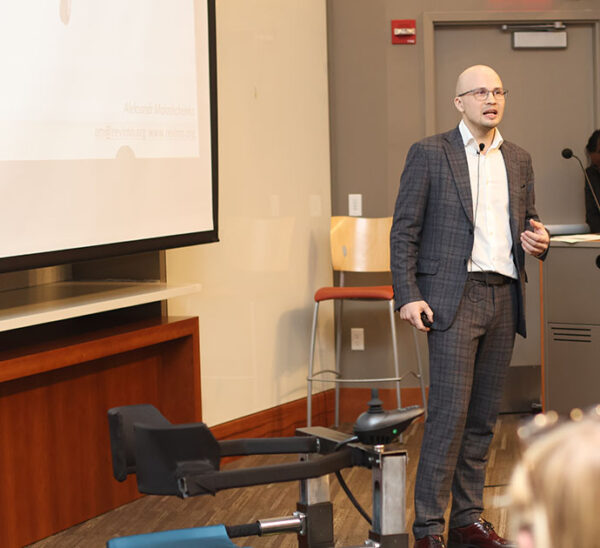
Malashchenko created ReviMo to help people like his grandfather get back their independence. Current devices meant to help the disabled get out of bed or a chair use belts and slings that can’t be operated by just one person.
“ReviMo is the first device to offer safe and independent use, fast easy process, and no belts and slings,” Malashchenko said. He joked after his win that his grandfather would urge him to hurry up and make ReviMo available if he were still alive today.
The other graduate finalists were Luis Martin MBA’24 of Develop U.S., an IT consultancy that would provide software development from Latin America for U.S. customers, and Plantex Tech, a material science company that produces chemically safe plant-based textiles founded by Gopika Maheshwari MBA’24 and Rohan Patil MBA’24.
Graduate judges were Wendy Hudson MBA’19, founding partner of Cisco Brewers; Ab Igram MBA’96, Executive Director of the Tariq Farid Franchise Institute; and Diana Yuan ’15, co-founder and SVP of people and operations at Indico Data.
BOND
Undergraduate student winner Samaha created BOND to address the rise in virtual workplaces, a situation that took a toll on her mental health during her first remote work internship.
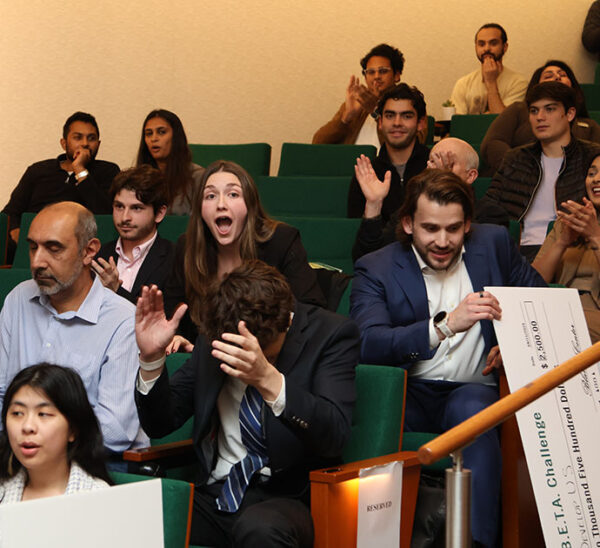
“Even after working there for six weeks, co-workers were nothing more than names on a screen,” Samaha said, adding that she felt isolated and lonely. Of the 44.5 million workers who left their jobs in 2023, the biggest reason they left was lack of employee engagement, Samaha said.
“BOND is an AI-powered employee engagement tool that gamifies the team bonding process,” Samaha said.
The other undergraduate finalists were Jake Ross ’24, who created Build You Marketing, a marketing agency that focuses on full brand growth and building a fan base; and Brock Alpher ’27 of SneakerSoul, a one-stop sneaker care company that created a flexible cover for sneaker soles to ensure they stay pristine.
The undergraduate judges were Scarlet Batchelor MBA’06, chief growth officer at Appalachian Mountain Club; Ryan Lupberger ’18, CEO and founder of Cleancult and 2018 B.E.T.A. Challenge undergraduate winner; and Will Magruder, vice president of partnerships at MassChallenge.
Special Awards
The Blank Center announced two other special awards handed out to honor the hard work and value creation of the contestants:
- The Family Entrepreneurship Award, a new award sponsored by the Bertarelli Institute for Family Entrepreneurship, provided $5,000 to Gopika Maheshwari MBA’24 and Rohan Patil MBA’24 of Plantex Tech.
- The Lila W. Sahney Endowed Fashion & Textile Award, sponsored by Gobind Sahney ’83 and daughter Sabrina L. Sahney, provided $20,000 to Adila Rammadia MBA’24 of Snug Scrubs.
Posted in Community, Entrepreneurial Leadership, Outcomes





